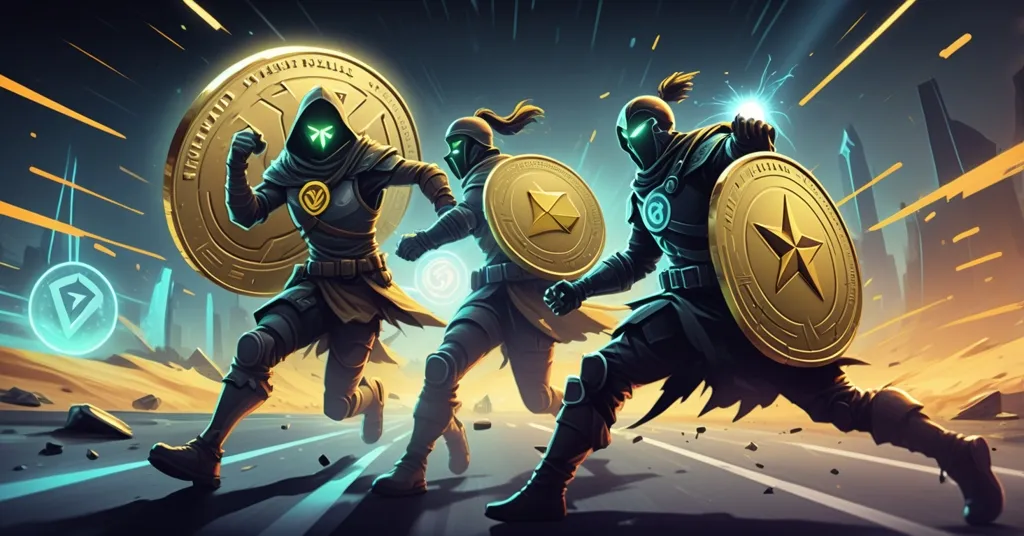ZCash Price Drops as Investors Shift to GhostWareOS ($GHOST) in Privacy Coin Shakeup

ZCash Price Dips as Smart Money Pivots to GhostWareOS ($GHOST) in Privacy Coin Evolution
A storm is brewing in the privacy coin sector, and ZCash ($ZEC), long the heavyweight champ of anonymous transactions, is feeling the heat. Its price has slipped from recent highs as capital flows toward GhostWareOS ($GHOST), a Solana-based upstart promising a new era of privacy infrastructure. Let’s unpack this shift and what it means for the future of financial anonymity.
- ZCash Decline: $ZEC falls from a $700 peak to the mid-$560s despite a 1,000% rally in 60-90 days.
- GhostWareOS Surge: $GHOST, trading under $0.01 with a $9-10M market cap, draws attention with cutting-edge tools.
- Market Shift: Whales are rotating from $ZEC to $GHOST, betting on massive upside potential.
Why Privacy Coins Matter
In a world of rampant surveillance, data grabs, and financial censorship, privacy coins are the rebel flag of cryptocurrency. They stand for the right to transact without Big Brother—or Big Bank—peeking over your shoulder. Bitcoin kicked off the decentralization party with pseudonymous transactions, but its transparency leaves much to be desired for true anonymity. That’s where privacy-focused projects step in, shielding users from prying eyes and offering a lifeline against overreach. The shift from ZCash to newer players like GhostWareOS isn’t just a price story; it’s a battle for the soul of financial freedom in the digital age. As governments toy with central bank digital currencies (CBDCs) and exchanges buckle under regulatory pressure, these coins aren’t just investments—they’re tools of resistance.
ZCash: The Reigning Champion Under Pressure
Since its launch in 2016, ZCash has been the gold standard for privacy in crypto. Built on zero-knowledge proofs called zk-SNARKs—a fancy way of saying transactions are verified without revealing who sent what to whom—$ZEC positioned itself as “digital gold” for those dodging surveillance or safeguarding wealth. Its market stats are nothing to scoff at: a $9 billion market cap, a recent peak above $700 in early November, and a jaw-dropping 1,000% price explosion over the past 60-90 days, including a 150% spike in the last month alone. Now hovering in the mid-$560s, $ZEC has benefited from macro chaos—think inflation fears, geopolitical uncertainty, and crackdowns on centralized exchanges—that’s driven investors to privacy as a hedge.
But let’s not pretend it’s all roses. That dip from $700, as reported in recent analyses like ZCash price updates, signals profit-taking and, more crucially, a pivot in investor sentiment. While $ZEC soared, likely riding Bitcoin’s coattails during risk-off market periods and news of exchange delistings for non-compliant assets, its focus remains narrow: anonymous money. And in a market increasingly hungry for utility beyond store-of-value, ZCash risks looking like a one-trick pony. It’s battle-tested, sure, with a loyal base that sees it as a bulwark against tyranny. Yet, as “smart money” starts eyeing broader use cases, $ZEC’s crown is wobbling.
GhostWareOS: The Underdog with Big Dreams
Enter GhostWareOS ($GHOST), a newcomer built on Solana, a blockchain known for lightning-fast transactions and dirt-cheap fees—think of it as the express lane of crypto highways. While ZCash focuses on hiding transaction details, $GHOST aims to be a complete privacy toolkit, covering everything from payments to personal data in the Web3 era. It’s trading at a measly sub-$0.01 price with a market cap of just $9-10 million and nearly 1 billion tokens circulating. Daily trading volume? A spicy $1.7-2.1 million, up over 100% in the last 30 days. That’s the kind of buzz that gets speculative hearts racing.
What’s got everyone excited? Let’s break down the tech without the yawn-inducing jargon. First, stealth addresses: every transaction gets a unique identifier, so no one can link multiple payments to you—kind of like using a different burner phone for every call. Then there’s the mixnet architecture, a decentralized relay system that bounces your data through multiple anonymous nodes, hiding your IP address. Imagine mailing a letter through a dozen random post offices so no one knows where it started. Add in zk-SNARKs, adapted for Solana’s high-speed environment, and you’ve got a privacy suite that’s not just about money—it’s about shielding your entire digital footprint.
Their economic model is slick too. $GHOST token value ties to platform usage fees, like on GhostPay, their encrypted payment system. More users, more demand for tokens—a neat little loop that could spark serious growth if adoption kicks in. With Solana’s vibrant DeFi ecosystem as its playground, $GHOST isn’t just a coin; it’s betting on being the backbone of private on-chain activity.
Capital Rotation: Whales Chasing Asymmetric Gains
Here’s where the rubber meets the road. On-chain data shows a ZCash whale dropping $30,000 on $GHOST tokens through Solana’s liquid markets. This isn’t pocket change—it’s a neon sign of capital rotating from mature assets to high-growth bets. With $ZEC’s market cap at $9 billion, its upside is constrained compared to $GHOST’s tiny $9-10 million valuation. We’re talking about a 900x difference. For whales who’ve already made bank on $ZEC’s 1,000% run, diversifying into low-cap gems like this is a no-brainer—they’re hunting for the next 100x, not another 2x.
This isn’t an isolated move. It mirrors a broader trend in crypto where “smart money” chases asymmetric returns during consolidation phases. Privacy remains hot, especially as data breaches and financial crackdowns dominate headlines, but investors aren’t content sitting on old giants. They want the next big thing, and $GHOST, with its utility pitch and Solana boost, fits the bill—for now.
Risks and Realities in the Privacy Coin Race
Hold your horses before you FOMO into $GHOST. A $9-10 million market cap isn’t just a bargain—it’s a red flag for wild volatility. One bad tweet or a whale dump, and your bag could be dust. The tech sounds impressive, but adoption is a giant question mark. Privacy protocols often promise the moon, only to fizzle when real-world use cases don’t materialize. And let’s talk Solana: it’s fast, yes, but it’s had outages—think 2021 and 2022 when the network ground to a halt under heavy load. If Solana trips, so does $GHOST. Plus, whispers of centralization in Solana’s validator setup could undermine the whole “decentralized privacy” narrative. Tread carefully; this isn’t a guaranteed jackpot.
Then there’s the regulatory guillotine. Privacy coins have been in the crosshairs for years—Monero ($XMR) and even ZCash have faced exchange delistings over AML/KYC concerns. Governments hate what they can’t track, and with CBDCs on the horizon, expect more heat. $GHOST, being newer and less battle-tested, might struggle to navigate this minefield, even on Solana. ZCash, for all its “yesterday’s news” vibes, has survived these storms. Its recent dip doesn’t erase a proven track record of securing wealth against prying eyes.
Let’s not forget the broader privacy coin landscape. Monero and Dash are still in the game, each with their own spin on anonymity. This isn’t a two-horse race, and capital rotation doesn’t mean abandonment of the sector—it’s more like a family growing messier. $ZEC’s 1,000% rally proves privacy still has legs; $GHOST is just the shiny new toy drawing eyeballs.
The Bigger Picture: Privacy’s Role in a Decentralized Future
As a Bitcoin maximalist at heart, I’ve got to throw in a jab: neither $ZEC nor $GHOST holds a candle to BTC as sound, simple money. Bitcoin’s focus is transparency and auditability—its blockchain is an open book, and that’s by design. Privacy? Not its forte, nor should it be. BTC is the ultimate store of value, not a cloak for hiding transactions. That’s why niche players like ZCash and GhostWareOS matter—they fill gaps Bitcoin deliberately leaves open. If you’re dodging a tyrannical regime or just want to buy something without a data trail, these projects are your shield.
Looking ahead, privacy coins face a weird duality. On one hand, growing DeFi integration and resistance to CBDCs could propel them to new heights—imagine $GHOST powering private smart contracts or $ZEC becoming a reserve for dissidents. On the other, regulatory sledgehammers and tech hurdles could stall momentum. Solana’s ecosystem is a hotbed for innovation, but can it sustain reliability under scrutiny? And will privacy tech evolve fast enough to outpace state surveillance? The next 1-2 years will be a proving ground. For now, this capital shift from $ZEC to $GHOST signals evolution, not extinction—a sign the fight for anonymity is adapting to Web3’s demands.
Key Takeaways and Questions on Privacy Coin Trends
- What’s behind the pivot from ZCash to GhostWareOS?
Investors are moving beyond pure transaction anonymity to privacy infrastructure on fast networks like Solana, where $GHOST offers a broader toolkit for digital secrecy. - Why are ZCash whales investing in $GHOST?
On-chain activity reveals large holders chasing outsized gains in $GHOST’s $9-10M market cap compared to $ZEC’s saturated $9B valuation. - How does $GHOST’s technology compare to $ZEC?
$GHOST delivers stealth addresses, mixnet IP hiding, and zk-SNARKs on Solana for comprehensive privacy, while $ZEC sticks to shielding transactions as a store of value. - Is $GHOST a riskier play than ZCash?
No doubt—its tiny market cap fuels volatility and unproven adoption, whereas $ZEC offers stability from years of weathering market and regulatory storms. - Does this shift signal fading interest in older privacy coins?
Not really; it’s about expanding into utility-driven projects. $ZEC remains a titan, while $GHOST represents a new frontier in the same fight for anonymity. - What role does Solana play in $GHOST’s rise?
Solana’s speed and low fees make it a fertile ground for innovative privacy tools like $GHOST, though past outages raise questions about long-term reliability. - How might regulation impact this privacy coin evolution?
Privacy coins face ongoing scrutiny—delistings and AML pressures could hit $GHOST harder as a newcomer, while $ZEC has more resilience from experience.
The privacy coin arena is far from settled. ZCash holds its ground as a proven giant, but GhostWareOS is making waves with fresh ideas and untapped potential on Solana’s turf. Whether this capital rotation is a fleeting hype train or the dawn of privacy’s next chapter, one truth stands: the quest for financial freedom and anonymity is alive and kicking. Keep your skepticism sharp and your keys secure—hype can inflate fast, but so can crashes. We’re watching this unfold with a critical eye, cutting through the noise to bring you the real deal.



